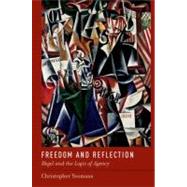
Note: Supplemental materials are not guaranteed with Rental or Used book purchases.
Purchase Benefits
What is included with this book?
| Acknowledgments | p. xiii |
| Introduction | |
| Hegel and Free Will | p. 3 |
| Hegel and the Traditional Problem of Free Will | p. 6 |
| Hegel's Theory of Free Will | p. 23 |
| The Problem of Expression as the Problem of Reflection | p. 36 |
| Introduction | p. 36 |
| Internal and External Determination in the Doctrine of Being | p. 38 |
| Internal and External Determination in the Concept of Reflection | p. 45 |
| Elements of the Theory of Reflection in Hegel's Moral Psychology | p. 58 |
| The Shape of the Project | p. 64 |
| Agency as Self-Explanation | |
| The Externality of Explanations and the Problem of an Infinite Regress | p. 69 |
| Self-Explanation as the Basic Form of Explanation | p. 75 |
| Ground as Expression | p. 75 |
| Internal and External Determination in Explanations | p. 83 |
| The Argument for Explanation as a Three-Term Relation | p. 86 |
| The Role of Conditions as the Third Term in Explanation | p. 100 |
| The Infection of Internality by the Conditions | p. 109 |
| Holism About Explanation | p. 113 |
| The Agent as a Locus of Self-Explanation | p. 118 |
| Agency as True Necessity | |
| The Necessity of Action and the Problem of Alternate Possibilities | p. 131 |
| Modality in Hegel's Logic | p. 139 |
| Modality as the Structure of Self-Expression | p. 139 |
| Contingency as a Unity of Actuality and Possibility | p. 144 |
| The Modal Continuum | p. 150 |
| The Necessity of Alternate Possibilities | p. 158 |
| Agency as True Necessity | p. 167 |
| Willkür and Wile | p. 167 |
| The Modal Argument for Hegel's Conception of the Free Will | p. 175 |
| Agency as Teleological Reciprocal Interaction | |
| The Mechanistic Challenge and the Problem of Passivity | p. 183 |
| Teleology, Mechanism, and Causation | p. 189 |
| The Question of Priority | p. 189 |
| Productivity as Expression | p. 192 |
| Freedom as Substance-Causation | p. 197 |
| The Passivity of Mechanical Causation | p. 206 |
| Causation as Reciprocal Interaction | p. 216 |
| Reciprocal Interaction as Freedom | p. 221 |
| The Teleological Form of Reciprocal Self-Determination | p. 224 |
| Teleological Agency | p. 235 |
| Arguments Against Determinism | p. 235 |
| A Teleological Philosophy of Action | p. 237 |
| Conclusion | p. 258 |
| Bibliography | p. 263 |
| Index | p. 269 |
| Table of Contents provided by Ingram. All Rights Reserved. |
The New copy of this book will include any supplemental materials advertised. Please check the title of the book to determine if it should include any access cards, study guides, lab manuals, CDs, etc.
The Used, Rental and eBook copies of this book are not guaranteed to include any supplemental materials. Typically, only the book itself is included. This is true even if the title states it includes any access cards, study guides, lab manuals, CDs, etc.